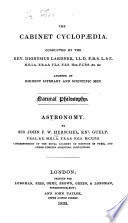 that every particle of matter in the universe attracts every other particle, with a force whose direction is that of the line joining the two, and whose magnitude is directly as the product of their masses, and inversely as the square of their distances... that every particle of matter in the universe attracts every other particle, with a force whose direction is that of the line joining the two, and whose magnitude is directly as the product of their masses, and inversely as the square of their distances...  Fragments of science for unscientific people - Página xvipor John Tyndall - 1875 - 422 páginasVista completa Fragments of science for unscientific people - Página xvipor John Tyndall - 1875 - 422 páginasVista completa - Acerca de este libro
 | sir John Frederick W. Herschel (1st bart.) - 1833 - 500 páginas
...instance, and provisionally, his law of universal gravitation, which may be thus abstractly stated : — " Every particle of matter in the universe attracts every other particle, with a force directly proportioned to the mass of the attracting particle, and inversely to the square of the distance... | |
 | Sir John Frederick William Herschel - 1833 - 444 páginas
...and provisidwally, his law of universal gravitation, which may be tliijis abstractly stated : — " Every particle of matter in the' universe attracts every other particle, with a force directly proportioned to the mass of the attracting particle, and inversely to the square of the distance... | |
 | William Whewell - 1833 - 298 páginas
...particles of which they are composed ; so that the final generalization, including all the derivative laws, is, that every particle of matter in the universe attracts every other, according to the law of the inverse square of the distance. Such is the law of universal gravitation.... | |
 | 1836 - 566 páginas
...particles of which they are composed ; so that the final generalization, including all the derivative laws, is, that every particle of matter in the universe attracts every other, according to the law of the inverse square of the distance. Such is the law of universal gravitation.... | |
 | Thomas Webster - 1837 - 512 páginas
...surface. For this purpose, he reasoned on his law of universal gravitation, which may be thus stated; ' Every particle of matter in the universe attracts every other particle, with a force varying inversely as the square of the distance.' Reasoning on this law, he calculated, from the effect... | |
 | 1839 - 272 páginas
...results from gravitation. The great Newton discovered and established the law of universal gravitation, " that every particle of matter in the universe attracts every other particle, with a force varying inversely as the square of the distance :" by which is meant, that if a body be attracted by... | |
 | Thomas Lockerby - 1839 - 566 páginas
...matter that the earth consists of. Gravity is a real power, of whose agency we have daily experience. " Every particle of matter in the universe attracts every other particle, with a force directly proportioned to the mass of the attracting particle, and inversely to the square of the distance... | |
 | sir Edward Johnson - 1842 - 586 páginas
...planetary motions, the velocities of falling bodies, &c., would have frequent occasion to mention the fact that " every particle of matter in the universe attracts every other particle with a force proportional, &c. &c." But this would be extremely troublesome, and even difficult to introduce intelligibly.... | |
 | T H. Howe - 1842 - 458 páginas
...that case, the general law applies in its strict wording." — Sir John Herschefs Astronomy p. 237. " Every particle of matter in the universe attracts every other particle with a force directly proportioned to the mas of the attracting particle, and inversely to the square of the distance... | |
 | 1905 - 864 páginas
...constitution; this being, of course, only a particular case of Newton's law of gravitation, which tells us that every particle of matter in the universe attracts every other particle with a force which depends on their masses and on the distances which separate them; the attraction being proportionately... | |
| |